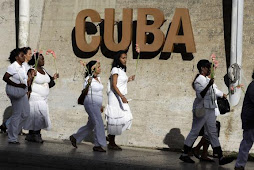An Optimistic Map of the Cuban Opposition
July 12, 2014
Erasmo Calzadilla
HAVANA TIMES — The Cuban opposition is a mind-boggling issue. The State
has shrouded itself with so much smoke and fear that it is practically
impossible to know the identity of those who confront it. From its point
of view, all are mercenaries, supporters of the US blockade and
champions of savage capitalism.
The truth, however, is that Cuba's dissident community is a complex and
varied universe. When it comes to government opponents, you find people
on both the Right and Left, anarchists and neo-totalitarians, anti and
pro-capitalists, violent militants and pacifists, Yanqui-lovers and
anti-imperialists. As they say in Cuba, there's "a bit of everything,
like in the pharmacy."
Faced with the government's campaign of disinformation, people tend to
adopt extreme postures: they either swallow the entire shit sandwich or
they assume that absolutely everything the government tells them is a lie.
As a result of this, many fledgling dissidents end up gravitating
towards the more recalcitrant groups that are more likely to be
infiltrated (and even organized) by State Security. No one has to come
and tell me this: I personally saw this happen to a very close friend of
mine.
Because of all this, I value and am grateful for socialist Haroldo
Dilla's recent efforts to undo this thick tangle and shed light on the
"nature" of different dissident groups in Cuba.
I also have some criticisms of Dilla's commentary Cuba: los nuevos
campos de la oposicion politica ("Cuba: The New Fields of Political
Opposition"). Some may be fruit of my ignorance, others perhaps not.
Only time will tell.
The first thing that strikes me is the optimism with which Haroldo looks
towards the future. This optimism cuts through his entire analysis and
leads him to conclusions that are, from my point of view, erroneous. The
following paragraph illustrates what I mean:
"On the other hand, we must regard the impossibility of continuing to
maintain Cuban society behind an information fence as a potentially
auspicious sign. As international contact increases and dissident or
critical actors multiply, the State begins to lose its communication
monopoly. The economic reforms and Cuba's insertion into the global
economy will demand greater access to cyberspace by the Cuban
population, with the implications this has for access to information and
interaction with the outside world. Everything points towards a future
that will afford the opposition greater elbow room."
Dilla takes the exponential and stable growth of the global economy and
communications for granted. If that premise were true, it would be
logical to assume that "political" dictatorship will give way to the
advance of globalization. The question is: will this growth take place?
The Intergovernmental Panel on Climate Change (IPCC) and nearly all
scientific communities involved in predicting climate patterns herald an
environmental crisis whose destructive power mirrors that of a global
war. Every year, they rectify their predictions, alerting us to the fact
that the crisis will hit earlier and harder than they originally thought.
Shouldn't this hot potato be one of the possible future scenarios we
consider in our political predictions?
The same holds for the energy (and raw material) crisis. Even those
scientific institutions that are most committed to development (I am
thinking of the International Energy Agency) are beginning to
acknowledge its seriousness. The oil company Shell tells us that, to
maintain our current consumption levels in the coming decade, we would
have to discover and vigorously exploit several deposits like the one in
Saudi Arabia. This is as impossible as covering the coming oil gap with
renewable sources of energy or nuclear power plants.
More and more geo-strategists are including the energy deficit and its
potentially destructive consequences among the factors that will steer
developments in the short and middle terms.
It is therefore valid to ask ourselves: why don't Cubanologists (I use
the term in its most positive connotation) accord it the importance it
deserves? Could it be they have bought into that bubble known as
"fracking"? If we couple this explosive situation with the progressive
destabilization of Venezuela, the political conflicts that are likely to
ensue following Raul Castro's retirement, less and less room for doubt
remains: we are sitting on a powder keg.
With such dark clouds and thunder looming in the horizon, isn't it a bit
crazy to assume business will continue as usual? We ought rather to
expect forms of political and economic destabilization that result in
greater authoritarianism (the much-feared imposition of a
North-Korea-like model) or, on the contrary, the complete but no less
traumatic destruction of the regime.
I am also "reproaching" all other Cuban political scientists and
politicians. As far as I know, not one has given environmental problems
and the energy crisis the importance they deserve. As the leaders they
are or pretend to be, they have the responsibility to become informed,
divulge the bad news and make decisions on the basis of the principle of
precaution.
This is the end of my reflection for today. In my next post, I will
continue to yap about the political map of the opposition drawn up by
the great Haroldo Dilla.
Source: An Optimistic Map of the Cuban Opposition - Havana Times.org -
http://www.havanatimes.org/?p=104824
Subscribe to:
Post Comments (Atom)





No comments:
Post a Comment